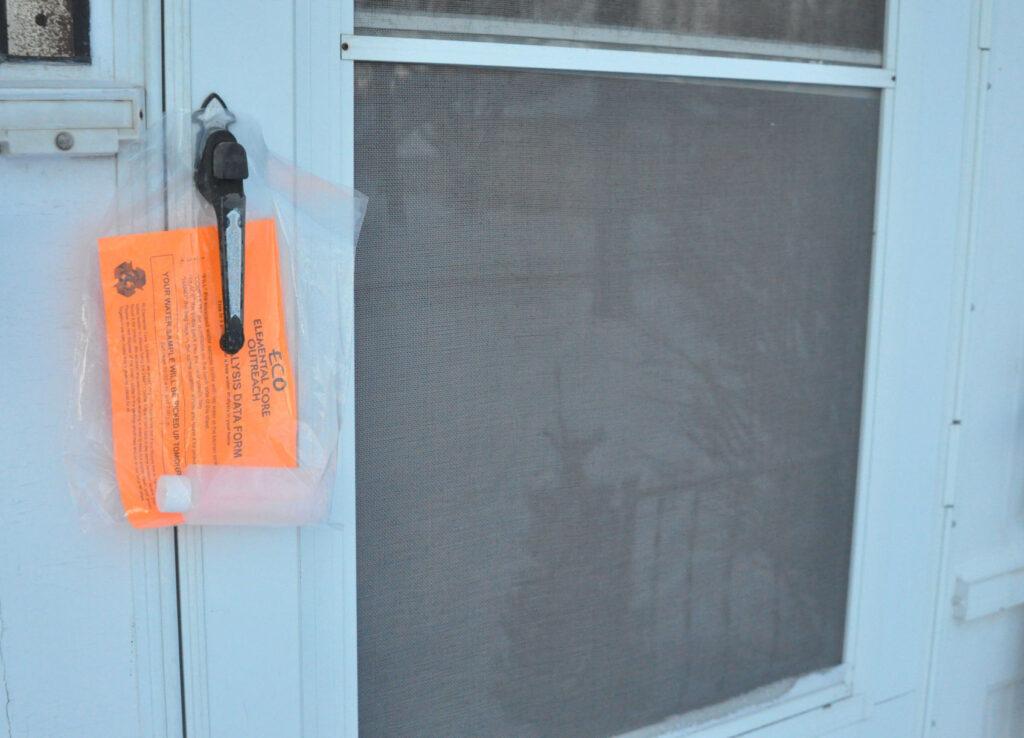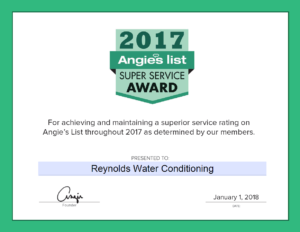Staff photo by Stephen Wiblemo
Did you recently receive a small bag with a bottle and flyer on your door offering you a free water analysis from a company called Elemental Core Outreach? If so, beware, these salespeople may use questionable, high-pressure techniques to try to sell you expensive water softener equipment you may not need.
This past week there were several reports on social media from people in Hutchinson who said they received these bottles and flyers. This technique is called a bottle drop, according to Jon Hantge of Tri County Water in Hutchinson. The bottles and flyers are left on residents’ doors, asking them to fill out a short questionnaire and leave it with the water sample to be picked up the next day.

This flyer, accompanied by a small plastic bottle, showed up on people’s doors in Hutchinson this past week. It’s from a company called Elemental Core Outreach and is not affiliated with the city.
Hantge said the bottle drops and flyers are not the questionable part. His company used to do them, too. It’s what’s not included on the flyers, he said, that should raise suspicion.
“When we do a bottle drop, we put our names, phone number and who we are so people can see we are legitimate,” he said.
The flyers left by Elemental Core Outreach do not include names or phone numbers. They give instructions to fill the bottle with water, complete the questions on the flyer, and put it back where it was found for pickup the next day.
Hantge said he’s seen this type of sales tactic before, especially in the Twin Cities, and that they typically try to target elderly and vulnerable people.
He said some people participated in this recent bottle drop and were later contacted by a company representative who told them their water had problems. When those people brought samples to Tri County Water for testing, however, Hantge said their water tested just fine.
Others were told that with their current water softener they would need to replace the resin bed annually, but in actuality resin beds are typically good for 10 to 15 years.
One couple reported they had a sales representative visit their house for what ended up being about a 3 1/2-hour sales pitch, during which they felt pressured to purchase a range of products for monthly payments around $200. Afterward, they were not given contact information for the sales representative.
Hutchinson officials confirmed the company has a permit to solicit in town.
The Hutchinson Water Department said it was not related to the bottle drops. It also said that when it does water testing, it always notifies residents before dropping bottles off.
An internet search of Elemental Core Outreach showed the company is based in Appleton, Wisconsin. On the company’s Facebook page, the first post was made in June 2017. According to the Better Business Bureau’s website, the company started in May 2017.
Other Facebook postings about Elemental Core Outreach revealed the company was in more towns this past year. A Lester Prairie resident named Jeanine Lore reported receiving one of the bottles and flyers in October, and the city of Howard Lake reported the bottle drops in December.
In Kimberly, Wisconsin, the company was denied a solicitor’s permit because it was soliciting before receiving approval.
Elemental Core Outreach’s website does not list a price for its Eagle 5600 SXT model water softener, or any of the other products it offers. The company also touts a lifetime warranty for its products, but upon closer inspection there appear to be some catches.
For instance, it says “if the equipment does not perform properly you should request service from the dealer that sold you the equipment.” This could be a problem if no other contact information is given other than the phone number and email address for the company’s headquarters in Wisconsin.
The warranty also states “If we are not able to arrange local servicing, you should send the defective part(s) (or, if you prefer, send the entire unit) directly to us, freight prepaid, with proof of purchase and a copy of this warranty.”
A phone call to the company’s headquarters was made to find out more information and how much its products cost. The woman who responded said she could not answer questions, but promised to have a representative call back. As of Tuesday morning, the call had not been returned.


